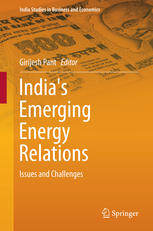

Most ebook files are in PDF format, so you can easily read them using various software such as Foxit Reader or directly on the Google Chrome browser.
Some ebook files are released by publishers in other formats such as .awz, .mobi, .epub, .fb2, etc. You may need to install specific software to read these formats on mobile/PC, such as Calibre.
Please read the tutorial at this link: https://ebookbell.com/faq
We offer FREE conversion to the popular formats you request; however, this may take some time. Therefore, right after payment, please email us, and we will try to provide the service as quickly as possible.
For some exceptional file formats or broken links (if any), please refrain from opening any disputes. Instead, email us first, and we will try to assist within a maximum of 6 hours.
EbookBell Team

0.0
0 reviewsThis book analyzes the role of energy in Indian foreign policy, particularly in defining bilateral relations. It also focuses on the critical gaps in conceptualizing its formulations and recommends a framework for sustainable energy security. India, the fourth largest consumer of oil, is an energy-deficit economy, importing more than eighty percent of its needs. This makes securing energy integral to its foreign policy goals. Obviously it is important for India to actively participate in the global energy market and establish robust, enduring and nuanced diplomatic relations with energy exporting countries. Equally important is that India diversifies its energy mix and moves towards carbon-free growth. Renewable energy is today high on the global energy agenda. Indian energy policy thus has to address a range of issues, domestically and on foreign turf. It has to move beyond the transactional mode by creating equity in the global energy industry.
Today, the global energy regime is undergoing fundamental changes, as is the power dynamics of the global energy order. There are now many new producers and diverse consumers. The trade in energy has increased in volume and its direction has shifted from the West to the East, and the ongoing structural changes in the energy market call for a new security architecture. Given the complex and competitive environment of the new geo-economics and geopolitics of energy, the question could well be, should India frame energy issues in conflict mode or move toward innovative cooperation? In either case the message is that India needs an integrated energy security policy.